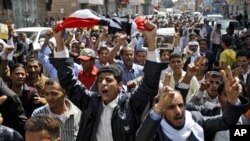Yemen's government security forces clashed with anti-government protesters Saturday, after groups of mostly young men, celebrating the resignation of former Egyptian President Hosni Mubarak, tried to march on the Egyptian Embassy.
Thousands of young Yemenis took to the streets of the capital Sana'a overnight and into the day Saturday to express enthusiasm over the resignation of Egyptian President Hosni Mubarak.
|
Middle East Scholar Michael Fischbach speaks with VOA's Susan Yackee about reform in the Arab world:
|
Eyewitnesses say that rallies took place spontaneously in parts of Sana'a, with demonstrators trying to rally in front of the Egyptian Embassy.
The Yemen Post newspaper editor-in-chief Hakim Almasmari says that government security forces skirmished with the crowds. A number of demonstrators were reportedly injured in the clashes. Almasmari adds that several people were also arrested:
"There were protests last night, massive protests, and today there were small protests, but not as big as the ones last night," said Almasmari. "Last night we estimate [there were] around 50,000 protesters. Today it was much smaller, not more than 5,000. Six people were arrested, four from the opposition and one or two from the pro-government protesters. So, those who were found causing chaos were arrested from both sides."
Almasmari says that several opposition leaders are trying to "take advantage of the crisis in Egypt to further their own political fortunes."
Yemeni President Ali Abdullah Saleh vowed to present a series of reforms to parliament, last week. Almasmari says he thinks the climate is ripe for an Egyptian-style protest movement in the coming weeks if reforms are not implemented.
Princeton University Yemen scholar Gregory Johnsen agrees with Almasmari that there is a possibility that public protests, similar to those in Egypt, could spread to Yemen:
"President Saleh's regime is at the moment entering I think a very critical time period," said Johnsen. "So I think the next three months really from now until Unification Day on May 22 are going to be incredibly important for President Saleh if he wants to remain in power and not go the way of [President Zine El Abidine] Ben Ali in Tunisia and President [Hosni] Mubarak in Egypt."
He points out that some of the protests within the last 24 hours took place "outside the umbrella of the opposition JMP movement" indicating that public discontent could be spreading.
Johnsen says that Western states, including the U.S., are worried that al-Qaida could take advantage of a security vacuum if President Saleh were to be toppled. He adds Al-Qaida would then be in a "better position to launch attacks" against either U.S. or European targets.




